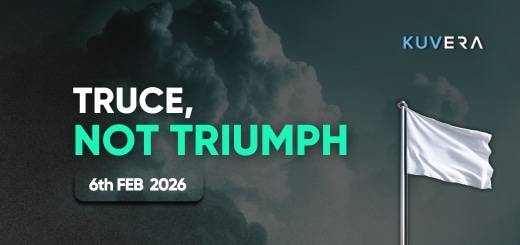This week, we talk about India’s biggest philanthropists and a controversy raked up by a rather innocuous sounding remark by Infosys co-founder NR Narayana Murthy. We then mention a raft of big-ticket deals that were sealed in sectors ranging from banking and insurance to healthcare and energy transition.
Welcome to Kuvera’s weekly digest on the most critical developments related to business, finance, and the markets.
tl;dr Hear the article in brief instead?
“If you are in the luckiest one percent of humanity,” legendary stock market investor Warren Buffett once remarked, “you owe it to the rest of humanity to think about the other 99 percent.”

Buffett, like his close friend and Microsoft founder Bill Gates, is known to be a generous philanthropist, having given away more than $51 billion to charities since 2006. Even Gates, who runs the Bill and Melinda Gates Foundation, along with his former wife, has donated more than $50 billion of his own money to philanthropic causes.
Much like the US and Europe, India too has had a long history of charities. If anything, giving away one’s wealth is considered a duty by most Indic religions, which put great emphasis on the virtue of renunciation.
It should come as no surprise then that as many as 25 new rich Indians figured among EdelGive Hurun India Philanthropy List for 2023, even as donations by the country’s wealthiest families and individuals shot up nearly 60% to Rs 8,445 crore in 2022-23. Overall, the list of people who donated at least Rs 5 crore had 119 names this year as against 108 last year.
HCL Technologies founder Shiv Nadar, along with his family, topped the list with a donation of Rs 2,042 crore, the fifth time he has managed to be the most generous donor on the list. Wipro’s Azim Premji was the second most generous with Rs 1,774 crore.
Nadar and Premji weren’t the only ones from the tech industry in the list. Infosys co-founder Nandan Nilekani and his wife, Rohini Nilekani, gave away Rs 189 crore and Rs 170 crore. Three more Infosys co-founders were on the list: Kris Gopalakrishnan donated Rs 93 crore for education, SD Shibulal gave away Rs 35 crore and K Dinesh shelled out Rs 47 crore to become the most generous new entrant on the list this year.
IT company Mindtree’s Susmita and Subroto Bagchi gave away Rs 110 crore while MA Yusuff Ali of Lulu Group made a donation of Rs 107 crore. With Rs 150 crore, former chairman of Larsen & Toubro, AM Naik, was the only professional to figure in the top-10 list.
Not everyone on the list was as generous this year as in the past. Mukesh Ambani, for instance, gave away 8% less amount this year at Rs 376 crore. Moreover, the total donation this year is lower than the Rs 14,755 crore India’s rich gave away in 2020-21.
But why should you, a retail investor, be bothered about how much the wealthy are giving away to charity? Investing, you see, is not just an exercise in growing one’s personal wealth. As people grow richer, they should ideally also invest in the growth of those around them. One way to do that is by giving a small bit of their wealth away towards philanthropy.
And the rich, especially the old money elite, know this only too well. Little wonder, then, that some of India’s biggest philanthropic foundations are managed by the likes of Nadar, Premji, Ambani, the Birlas, the Tatas and their ilk. So, as you get ready to revel in this festive season, and top up on your regular investments, do try and follow in the footsteps of India’s super-wealthy and consider donating a small sum of money to a charity of your choice.
The 70-hour debate
Even as his fellow co-founders made news for their generosity, Infosys’ former top boss NR Narayana Murthy raked up a controversy this week. Murthy, who was conspicuously missing from the list of top donors, remarked that youngsters should work 70 hours a week for nation building. His remark left netizens divided and triggered an acrimonious debate on and off social media platforms.

In a podcast conversation with former Infosys HR director and board member TV Mohandas Pai, Murthy said that India’s work productivity is one of the lowest in the world and that the youth must shoulder the responsibility for the nation’s progress. “Therefore, my request is that our youngsters must say, This is my country; I’d like to work 70 hours a week,” he stated.
This innocuous sounding remark drew sharp criticism from everyone including other founders and top corporate executives, social media influencers, TV journalists, politicians and even Bollywood actors.
Some people including Pai, Murthy’s wife Sudha, Ola founder Bhavish Aggarwal, JSW Group chairman Sajjan Jindal, Shaadi.com founder Anupam Mittal and Bollywood star Suniel Shetty came out in Murthy’s support. But several others like Bharat Pe co-founder Ashneer Grover and comedian Vir Das were critical of what Murthy said.
Others like industrialist Harsh Goenka said that the five-day work week was dead thanks to the emergence of remote work, with technology allowing people to work flexibly. Former Tech Mahindra chairman CP Gurnani said a 40-hour work week was ideal while Marico chairman Harsh Mariwala disagreed with Murthy’s remark.
So, what do you think about working 10-14 hours a day?
Deal Street
Controversies aside, this was a week of big-ticket deals, which meant that at least one class of people—investment bankers—were hard at work.
Swiss insurance major Zurich Insurance Group said this week that it will pick up a 51% stake in Kotak Mahindra General Insurance Company for about Rs 4,051 crore through a combination of fresh capital infusion and share purchase. This will be the largest investment by a foreign insurer in an Indian non-life insurance firm.
The transaction values Kotak General Insurance at about Rs 7,943 crore, or $955 million. Zurich Insurance intends to acquire an additional 19% stake within three years of closing the deal, which will take its holding in the Kotak unit to 70%, just below the 74% cap the government imposes on foreign companies in the insurance industry.
Meanwhile, in the first merger between two small finance banks, AU Small Finance Bank said this week it will acquire smaller peer Fincare SFB. The all-stock merger will help AU SFB diversify its portfolio and expand its deposit and asset franchise significantly, especially in South India.
In yet another big-ticket deal, private equity behemoth Blackstone entered India’s healthcare sector with the acquisition of a 75% stake in Hyderabad-based CARE Hospitals from PE firm TPG. Blackstone is also bankrolling CARE’s acquisition of an 80% stake in Kerala’s KIMS Healthcare. Overall, Blackstone will pump in $1 billion for the twin deals.
Meanwhile, the renewable energy arm of Malaysian oil and gas major Petronas, Singapore sovereign wealth fund GIC and a company set up by the founders of Indian green energy major Greenko formed a $2-billion green ammonia venture this week. The three investors said that the new entity will look to produce and export 5 million tons per annum of green ammonia by 2030.
IPO Street
India’s primary markets have boomed in 2023 with almost 150 companies launching initial public offerings so far. Three more companies joined the bandwagon this week—Mamaearth, Cello World and ESAF Small Finance Bank.

Skincare brand Mamaearth’s IPO was oversubscribed by 7.6 times as the offering of 2.89 crore shares, excluding the anchor allotment option, received bids for over 22 crore shares. This means it got bids worth Rs 7,130 crore.
Kitchenware products maker Cello World did a whole lot better as its IPO was oversubscribed almost 40 times. Investors sought to buy 85.8 crore shares, versus the 2.2 crore shares on offer, placing bids worth Rs 55,619 crore.
In both IPOs though, institutional investors led the bidding while retail investors remained relatively cautious. One reason for their caution is that the offer-for-sale portions from existing shareholders was far greater than the fresh issue, which means the companies themselves aren’t raising much capital for growth.
While Mamaearth’s shareholders sold shares worth over Rs 1,336 crore while the company itself raised Rs 365 crore. Cello World’s shareholders are selling shares worth Rs 1,900 crore and the company itself if not offering any shares.
Both the companies will list on the stock exchanges early next week. Mamaearth will command a valuation of Rs 10,500 crore at the top end of its price band while Cello World will be worth around Rs 13,750 crore, topping the market values of rivals Borosil, Stovekraft and Butterfly Gandhimathi Appliances.
Meanwhile, ESAF Small Finance Bank opened its IPO on Friday to raise up to Rs 463 crore. This comprises a fresh issue of Rs 390.7 crore and an offer-for-sale of Rs 72.3 crore shares by three selling shareholders.
MF interest
In a development that would be specifically useful to readers of this newsletter, the Association of Mutual Funds in India (AMFI) has come up with new norms with a view to protect investors’ interest.
The industry group has put a cap on expected returns that mutual funds can highlight in their illustrations and calculators. These caps are linked to 10-year rolling returns generated by each asset class.
So, the maximum future return used in illustrations must be less than 13% for equity schemes, 7.2% for fixed-income schemes 8.5-10% for hybrid funds, AMFI said.
Meanwhile, capital markets regulator SEBI this week simplified the format of mutual fund offer documents to ease the preparation of Scheme Information Documents (SID) and to increase their readability for investors.
The new format will be implemented with effect from April 1, 2024, SEBI said.
Market Wrap
Despite losing nearly all their gains mid-week, the two benchmark indices recovered smartly in the last couple of days to end the week in the green. While the Sensex rose just over 0.9%, the Nifty was up just under 1.0%.
Over the past month though, both indices are still down by more than 1.6% and 1.4%, respectively, as the markets remain volatile given the uncertainty surrounding the Israel-Hamas conflict, which could spread if the Iranian-backed Hezbollah decide to formally enter the war.
The Nifty stocks that gained the most during the week were Indian Oil, Vedanta, Bharat Petroleum, and State Bank of India. Other counters that supported the rally were Cipla, Titan, Hindalco, Reliance Industries and ONGC.
Nifty stocks that fell the most in the week included the likes of UPL, Dr. Reddy’s, Tata Steel, Bajaj Finance, ITC and three auto majors—Mahindra & Mahindra, Maruti and Hero MotoCorp.
Other headlines
- US Federal Reserve keeps interest rates unchanged
- Sam Bankman-Fried convicted of multi-billion-dollar FTX fraud
- Govt allows direct listing of public companies on foreign stock exchanges
- Govt authorises Apple, Dell, Lenovo, HP, Samsung, Asus, others to import laptops, tablets
- Tata Steel Q2 consolidated net loss at Rs 6,511 crore versus year-ago profit of Rs 1,297 crore
- Tata Motors Q2 profit Rs 3,764 crore versus net loss of Rs 945 crore year ago, misses estimate
- Pizza Hut operator Sapphire Foods Q2 profit falls 43%, misses forecasts
- Dabur Q2 consolidated net profit up 5% at Rs 515 crore, tops analysts’ view
- Adani Enterprises Q2 net profit drops almost 50% to Rs 228 crore, revenue slumps 41%
- Adani Power Q2 profit soars to Rs 6,594 crore from Rs 696 crore a year earlier
- Adani Green in talks to raise $1.8 billion loan
- Cognizant expects Oct-Dec revenue below estimates due to weak corporate spending
- Britannia Q2 profit up 19.1% to Rs 588 crore, tops analysts’ estimate
- Sun Pharma Q2 profit Rs 2,376 crore vs Rs 2,262 crore, beats forecast
- Hero MotoCorp, TVS Motor, Bajaj Auto Q2 profits exceed market forecasts
- NSE Q2 net profit climbs 13% to Rs 1,999 crore
That’s all for this week. Until next week, happy investing!
Interested in how we think about the markets?
Read more: Zen And The Art Of Investing
Watch here: Investing through various economic and market cycles
Start investing through a platform that brings goal planning and investing to your fingertips. Visit kuvera.in to discover Direct Plans and Fixed Deposits and start investing today.











